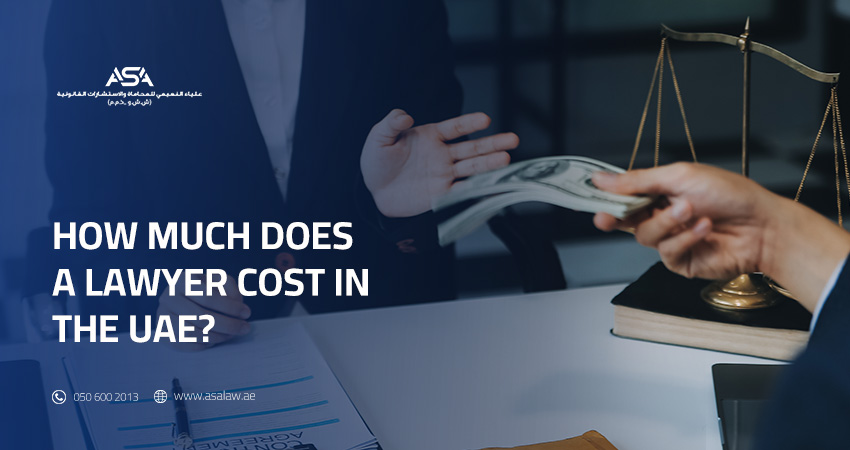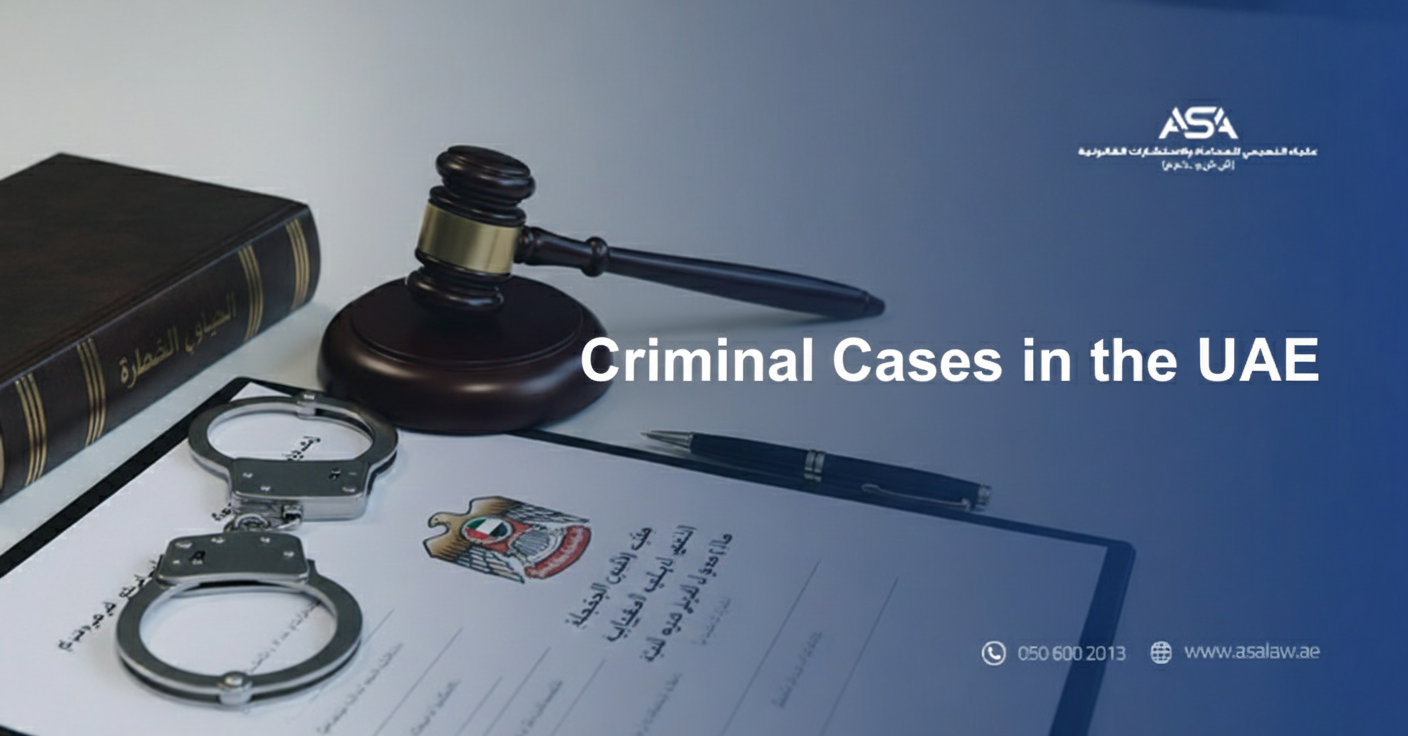Comprehensive Guide to Crimes, Penalties, Legal Procedures, Appeals, Rights of the Accused, and Bail Introduction.
Criminal cases in the United Arab Emirates (UAE) are a cornerstone of protecting public safety and ensuring the rule of law. They cover all offenses specified under Federal Decree-Law No. 31 of 2021 on Crimes and Penalties (the UAE Penal Code) and follow strict procedures outlined in Federal Decree-Law No. 38 of 2022 on Criminal Procedure.
A criminal case typically passes through several stages: arrest and police investigation, public prosecution investigation, trial before criminal courts, issuance and enforcement of judgment, with full protection of the accused’s fundamental rights such as the right to defense, fair trial, bail release, and the right to appeal or file for cassation.
At Aliya Salem Al Nuaimi Law Firm, we provide comprehensive legal representation for criminal cases across all emirates. Led by Attorney Aliya Salem Al Nuaimi, our team handles defense of the accused, bail applications, appeals, cassation petitions, and the protection of clients’ legal rights at every stage.
Table of Contents
-
Types of Criminal Cases in the UAE
- Felonies
- Misdemeanors
- Violations
-
Types of Penalties under UAE Law
- Principal Penalties
- Supplementary Penalties
- Consequential Penalties
- Objectives of Penalties
-
Stages of a Criminal Case in the UAE
- Arrest and Police Investigation
- Public Prosecution Investigation
- Trial Before Criminal Courts
- Post-Judgment Stage (Opposition, Appeal, Cassation)
-
Bail in UAE Criminal Cases
- Conditions for Bail
- Procedures for Bail Applications
-
Criminal Courts in the UAE
- Major Felony Court
- Minor Felony Court
- Misdemeanor Court
-
Role of the Criminal Lawyer
- Representation from Investigation Stage
- Legal Defense and Pleadings
- Court Advocacy and Appeals
- Strategic Legal Consultations
- Post-Judgment Rights Protection
-
FAQ – Frequently Asked Questions About Criminal Cases in the UAE
-
Types of Criminal Cases under UAE Law
Articles 28–34 of the UAE Penal Code classify crimes into three main categories:
Felonies
These are the most serious crimes, including premeditated murder, terrorism crimes, state security offenses, large-scale drug trafficking, and major bribery cases. Penalties often include death penalty, life imprisonment, or long-term imprisonment.
Misdemeanors
Less severe crimes such as petty theft, simple assault, minor fraud, defamation and insult. Penalties typically include imprisonment of up to three years or a fine.
Violations
Administrative or regulatory breaches, such as certain traffic or environmental offenses, usually punishable by fine only.
🔗 Reference: UAE Ministry of Justice – Federal Penal Code
-
Types of Penalties in UAE Criminal Law
Chapter Five of Federal Decree-Law No. 31/2021 lists the penalties UAE courts may impose:
Principal Penalties (Articles 66–72)
- Death Penalty: For the most serious crimes, such as premeditated murder under aggravating circumstances.
- Life Imprisonment: 25 years for major crimes, including terrorism and state security offenses.
- Temporary Imprisonment: 3 to 15 years, depending on the crime.
- Imprisonment: One month to three years for misdemeanors.
- Fine: From AED 1,000 to AED 10,000,000 for felonies, or up to AED 5,000,000 for misdemeanors.
Supplementary Penalties (Articles 83+)
- Confiscation of crime tools or proceeds.
- Deportation of non-citizens for certain crimes (mandatory or discretionary).
- Closure of premises used to commit the crime.
Consequential Penalties
- Loss of certain rights (e.g., holding public office).
- Revocation of licenses or permits when crimes are committed in the course of professional activity.
Purpose of Penalties
UAE law balances general deterrence (protecting society), specific deterrence (preventing re-offense), rehabilitation (through prison programs), and justice by ensuring proportionality between crime and punishment.
- Stages of a Criminal Case in the UAE
- Arrest & Police Investigation
- Case begins with a police complaint or arrest in flagrante delicto.
- Police gather evidence, question witnesses, prepare reports, and refer case to the Public Prosecution.
Rights of the Accused at this Stage:
- To be informed of charges in a language they understand.
- To be detained only within the legal limit (48 hours before referral to prosecution).
- To contact a lawyer or request legal aid.
Bail Request at Police Stage:
Defense lawyer may request temporary release, but final decision usually rests with the Public Prosecution.
- Public Prosecution Investigation
- Prosecution decides whether to file charges or dismiss the case.
- They interrogate the accused, decide on bail release or pre-trial detention.
Rights of the Accused:
- Presence of a lawyer during questioning.
- Right to remain silent.
- Right to request bail.
Bail Procedure:
A written application must be filed with supporting guarantees. Rejected requests can be appealed to the criminal judge.
-
Criminal Trial
- Case referred to Misdemeanor Court or Felony Court.
- Hearings scheduled with adequate notice (1 day for violations, 3 days for misdemeanors, 10 days for felonies).
- Public trial unless secrecy is required.
Rights During Trial:
- Right to present defense, summon witnesses, challenge evidence, and request expert reports.
- Right to appeal judgment if convicted.
Bail During Trial:
Defense lawyer may renew the bail application; court considers severity of offense and risk of flight.
- Post-Judgment: Opposition, Appeal & Cassation
- Opposition: For in absentia judgments in misdemeanors/violations (must be filed within 7 days of notice).
- Appeal: Must be filed within 15 days for defendants, 30 days for Public Prosecution.
- Cassation: Filed within 30 days before the Supreme Court for errors of law or procedure.
- Bail in UAE Criminal Cases
Bail is a crucial right enabling the accused to remain free until final judgment.
Conditions for Bail
- Financial or personal guarantee ensuring presence before authorities.
- Must not jeopardize investigation or public safety.
- Final decision rests with prosecution or court (can be appealed).
Bail Procedure
- Police Stage: Lawyer files request directly with police.
- Prosecution Stage: Written application to prosecution citing guarantees (Articles 111–118, Criminal Procedure Law).
- Trial Stage: Renewed application before court, which sets bail amount, may impose travel ban or other conditions.
- Criminal Courts in the UAE
- Major Felony Court: Handles crimes punishable by death or life imprisonment (e.g., murder, terrorism).
- Minor Felony Court: Handles felonies with temporary imprisonment.
- Misdemeanor Court: For less severe crimes (theft, fraud, defamation).
- Criminal Appeal Courts: Review first-instance judgments.
- Supreme Court / Court of Cassation: Final stage of litigation, reviewing law application and procedure.
- Role of a Criminal Lawyer
Engaging a specialized criminal lawyer in the UAE is essential for protecting rights.
At Alya Salem Al Nuaimi Law Firm, we:
- Represent Clients from Day One – attend police/prosecution investigations to safeguard rights.
- Prepare Legal Defense & Pleadings – draft bail requests, defense memoranda, and procedural objections.
- Appear Before All Courts – from first-instance to Supreme Court.
- Provide Strategic Legal Advice – including opposition, appeal, and cassation options with deadlines.
- Protect Rights Post-Judgment – during sentence execution, early release applications, and rehabilitation processes.
- Frequently Asked Questions (FAQ) About Criminal Cases in the UAE
Q1: What is the time limit to file an appeal in a UAE criminal case?
You must file an appeal within 15 days from the date of judgment notification (30 days for Public Prosecution). If this deadline is missed, the judgment becomes final and enforceable.
Q2: Can I get bail in all criminal cases?
Bail may be granted in most misdemeanors and some felonies if:
- The accused is not a flight risk.
- The crime does not involve serious offenses like state security crimes or capital punishment.
- The accused provides sufficient financial guarantee or a reliable personal guarantee.
Q3: What are my rights if I am arrested in the UAE?
- To be informed of the charges in a language you understand.
- To contact your lawyer or request a court-appointed lawyer.
- To remain silent during interrogation.
- To be presented before the Public Prosecution within 48 hours.
Q4: How long can I be kept in pre-trial detention?
- Police may detain you for 48 hours before referral to prosecution.
- Public Prosecution can extend detention for 14 days, renewable up to 30 days.
- Longer detention requires judicial approval from a competent judge.
Q5: What are the most common criminal cases in the UAE?
- Theft and fraud cases
- Drug-related offenses
- Cybercrime and online fraud
- Financial crimes and embezzlement
- Assault and defamation cases
Q6: Can a criminal judgment be overturned?
Yes, by:
- Filing an Opposition against an in-absentia judgment.
- Filing an Appeal within 15 days (misdemeanors/felonies).
- Filing a Cassation Petition within 30 days for legal/procedural errors.
Q7: Can a foreigner be deported after a criminal conviction?
Yes, UAE courts may issue a mandatory or discretionary deportation order depending on the type of crime, especially for drug-related and moral crimes.
Q8: How can a criminal lawyer in Abu Dhabi help me?
A specialized criminal lawyer can:
- Attend investigations and ensure your rights are protected.
- File a strong bail request with proper guarantees.
- Draft defense memoranda and appeal petitions.
- Represent you in all court hearings up to the Supreme Court.
- Work towards sentence reduction, suspension, or early release.
Q9: Can I leave the country while a criminal case is pending?
Usually no. A travel ban is often imposed until the case is closed or a bail order explicitly allows travel.
Q10: How to contact a criminal lawyer in Abu Dhabi?
You can contact Alya Salem Al Nuaimi Law Firm to schedule a confidential consultation. Our team provides 24/7 legal support and representation in all criminal cases across the UAE. HOTLINE : 0506002013.





